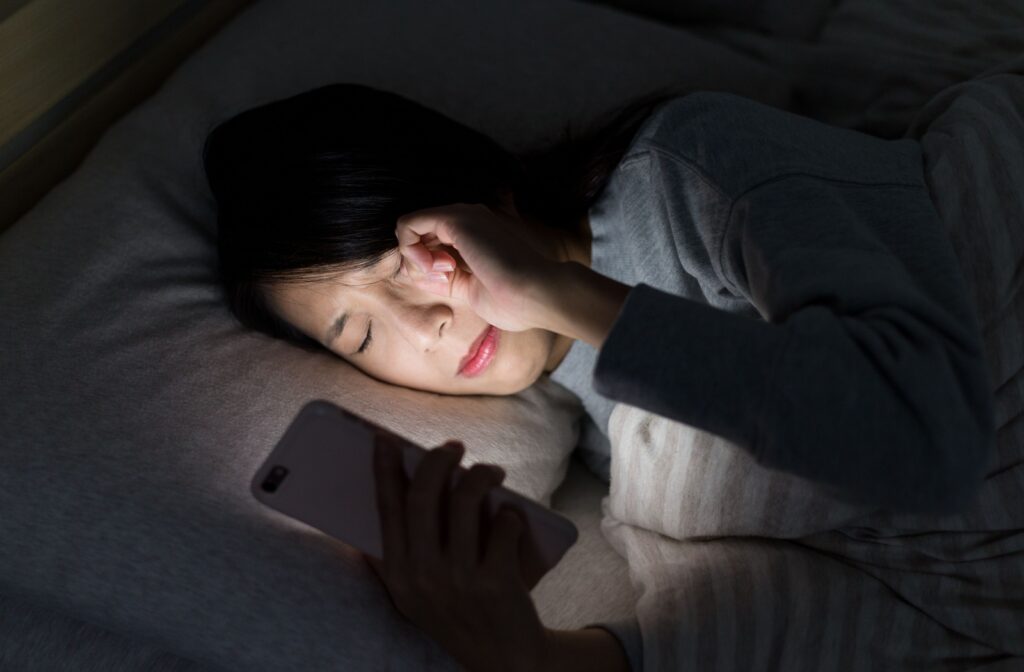There’s nothing quite like the comfort of crawling into a bed after an exhausting and productive day. However, waking up the next morning with dry, irritated eyes can sour your mood, and no one likes starting their day with such an inconvenience.
The unfortunate truth is that you can experience dry eyes at any point. However, certain factors can aggravate dry eye symptoms, especially at night.
From simple solutions to advanced therapies, there are several ways you can effectively relieve extreme dry eyes at night:
- Creating a hydrating sleep environment: Humidifier, drinking water, and adjusting room temperature
- Protecting your eyes: Sleep mask, warm compress mask, artificial tears, eye ointment, and limiting screen time
- Advanced dry eye therapies: Prescription eye drops and punctal plugs
The key to long-term dry eye relief is identifying its root cause, and visiting your eye doctor for a dry eye evaluation is a step in the right direction.
Defining Dry Eyes
Besides helping us express heartfelt emotions, tears play a functional role in our overall eye health. They’re responsible for keeping your eyes hydrated and protecting them from irritants like debris or dust. However, instability in the tear film can lead to dry eye development.
Dry eyes are a chronic condition that occurs when your eyes don’t produce enough quality tears or they evaporate too quickly from the eye’s surface.
If your eyes feel dry, gritty, or fatigued when you wake up (common dry eye symptoms), these are clear signs that your eyes aren’t staying hydrated overnight. This begs the question: Why does this happen?
Can Sleep Affect Dry Eyes?
Sleeping is our body’s way of restoring, and several mechanisms either take over during this time or slow down. For instance, it’s normal for tear production to slow down. Think about it; we aren’t blinking when our eyes are closed and at rest.
Not to mention, studies suggest a connection between quality sleep and eye health. Sleep deprivation can disrupt the balance of your tear production. Poor-quality or interrupted sleep can slow down the natural regeneration process of your eyes, worsening dryness.
On top of that, the quality or quantity of some people’s tears may already be insufficient, leading to extreme dryness, since dry eye has several causes:
- Age: Tear production naturally declines with age.
- Environmental conditions: Exposure to wind, smoke, dry climates, and extended time in air-conditioned or heated spaces can accelerate tear evaporation.
- Nocturnal Lagophthalmos: A condition where your eyelids don’t close entirely, accelerating tear evaporation.
- Meibomian gland dysfunction (MGD): A condition where oil-secreting glands along the eyelids become clogged, leading to an unstable tear film.
- Prolonged exposure to digital screens: Extended screen time leads to less blinking, eye strain, and increased tear evaporation.
Suppose you’re living in a dry climate, sleeping with the air conditioner on full blast, or spending considerable time on your smartphone before bed. If you already have pre-existing dry eyes, these factors can add to the problem, leaving your eyes dehydrated.

Simple Solutions for Dry Eye Relief
Given its chronic nature, there’s no permanent way to cure dry eye, but not to worry! There are measures you can take to manage dry eye and improve symptoms.
Create a Hydrating Sleep Environment
A dry bedroom can worsen dry eye symptoms. Simple changes can promote a humid and hydrated sleep environment.
Keep a humidifier running overnight to maintain solid humidity levels and prevent the air from pulling moisture out of your eyes.
Adjust the temperature of your room by limiting or lowering the air conditioning, or avoiding heat blowing directly onto your face. As valuable and convenient as these symptoms are, using them improperly can create a dry environment.
Besides, drinking plenty of water throughout the day (and keeping a water bottle on your nightstand) is a great way to promote overall hydration and support your tear film.
Protect Your Eyes
There are several ways to promote hydration and protect your eyes while you sleep, such as:
- Sleep mask: If your eyes don’t close completely during sleep, a sleep mask can help protect your eyes by limiting air exposure.
- Warm compress mask: Warm this mask in the microwave and apply it over your eyes while gently massaging the area. This helps unclog oil glands along the eyelids to encourage oil secretion in the tear film. Plus, it’s a great relaxing ritual to try before bed!
- Preservative-free eye drops: These over-the-counter drops mimic the natural composition of tears to promote moisture on the eye surface. They can be used throughout the day and especially before bed.
- Eye ointment: Apply this thick cream along the lash line before bed. This helps retain moisture and prevent dryness throughout the night. It’s great for those with incomplete lid closure.
- Limit screen time before bed: Reducing screen time at least an hour before bed allows your eyes to rest and encourages natural blinking. Try reading a book instead to promote better sleep!
Advanced Dry Eye Therapy
If you’re experiencing extreme dryness, turn to your optometrist to explore advanced dry eye therapy, which targets dry eye’s root cause for long-lasting relief.
- Prescription eye drops: These medicated eye drops reduce inflammation and increase tear production.
- Punctual plugs: These small devices are inserted into the tear ducts to help retain tears on the eye’s surface and maintain moisture.
As a bonus, these therapies pair well with management strategies like artificial tears, ointments, and masks!
Experience Sound Sleep
If you’re struggling with dry eyes, especially at night, it’s worth examining your eye health and identifying any barriers to restful sleep.
If you’ve tried home remedies but continue waking up with irritated eyes, it might be time for expert guidance. Connect with our Total Vision Sports Arena team to schedule your dry eye consultation.
Better sleep equals better eye health (and vice versa)!



